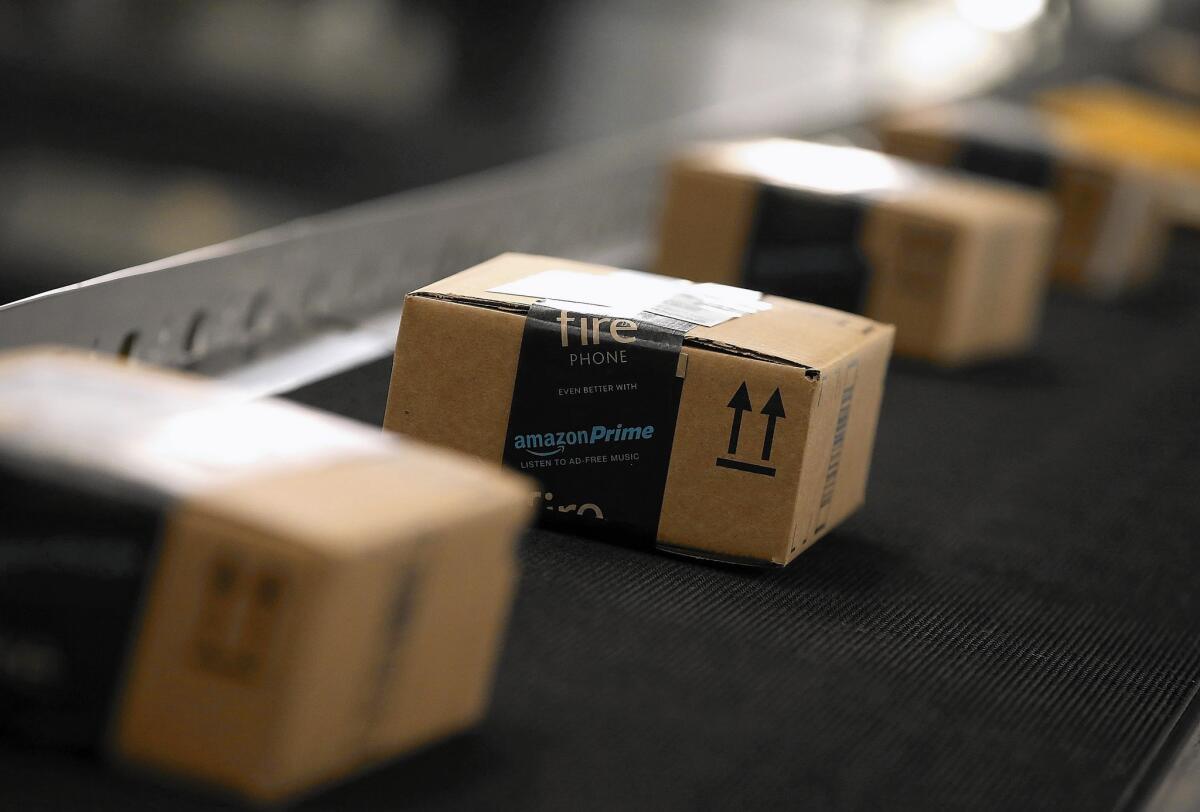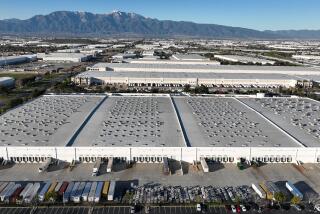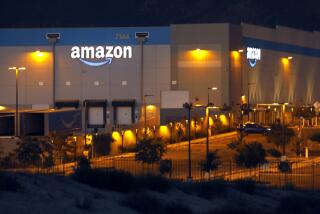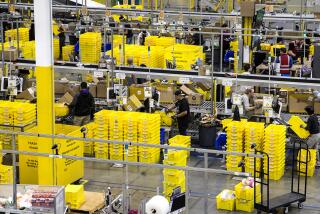Amazon cuts back on price, delivery times by cheating workers, lawsuit says

Taree Truong wore a uniform bearing Amazon’s logo, signed into an Amazon tracking device and was told by Amazon dispatchers to make deliveries for its new Prime Now courier service across far-flung parts of Orange County.
During one trip at rush hour, Truong said she was expected to drive from Amazon’s Irvine warehouse to Lake Forest, then Mission Viejo, back to Irvine and on to Newport Beach — all within two hours.
“Everything we did was under their control,” said Truong, of Garden Grove. “They’re telling us where we need to go, how to deliver these packages to customers and how to interact with those customers when we’re there.”
Yet Truong and other drivers for Amazon Prime Now weren’t considered employees of Amazon or Scoobeez, its contracted courier company. Instead, they were treated as independent contractors — making them ineligible for overtime pay, mileage reimbursement, workers’ compensation and other protections given to employees under state and federal law.
She’s one of four former Prime Now drivers who sued the company and its contractor in state court this week, alleging that Amazon is achieving speed and affordability only by cheating workers.
SIGN UP for the free California Inc. business newsletter >>
Amazon aims to reduce its traditional two-day delivery to less than two hours, and has expanded its Prime Now delivery service to more than 15 major U.S. cities in less than a year.
Using strategically located warehouses, the Internet retail giant promises near-instant gratification for customers who want cheap paper towels, snacks or toys. But the quest for brutal efficiency often falls on Amazon workers, according to the lawsuit.
An Amazon spokeswoman said the company does not comment on pending litigation, and company representatives did not respond to additional questions on whether Prime Now drivers in other parts of the country are also classified as contractors. Scoobeez did not respond to requests for comment.
The suit is the latest battleground in the employee-vs.-contractor debate that has raged over the last year. High-flying start-ups such as Uber, Lyft and Handy also face challenges from workers who say the companies are profiting by paying less in labor costs. The companies, in turn, have argued that workers benefit from more flexible schedules and are free to pursue other gigs.
While Silicon Valley start-ups have attracted outsized public attention, much of the debate centers on industries where work is performed off-site: maintenance, IT installation and delivery driving.
Although drivers are paid $11 an hour, the suit contends that many are in reality receiving less than California’s $9 minimum wage after factoring in expenses such as gas, tolls and maintenance.
If drivers arrived even one minute outside the required two-hour delivery window, they could be disciplined or fired, the plaintiffs allege. Lawyers for the four named plaintiffs are seeking class-action status in the suit.
“They knew exactly where we were every single minute,” said Cynthia Miller, one of the named plaintiffs in the suit, who also delivered packages in Orange County. “We were told when to take a lunch, when we get there, when we get to leave.”
Truong said dispatchers often weren’t familiar with the geography and unique traffic conditions of Southern California, putting drivers under immense pressure to fulfill orders during the afternoon rush hour.
“They don’t factor in the time of day, they don’t factor in the different locations,” Truong said. “There’s just no way you can get on the 405 at that time of day and make it.”
Former Amazon Prime Now drivers said Scoobeez was only one of several courier contractors in Southern California. The service is offered in many major markets across the country, including New York City, Chicago, San Francisco and Austin, Texas — and the company has promised more expansion in coming months.
Federal and state authorities in recent years have stepped up scrutiny of companies that misclassify employees as independent contractors, noting the loss of revenue in the form of payroll taxes, unemployment insurance and workers’ compensation funds. The National Employment Law Project, a Washington advocacy group, has estimated that employers can save up to 30% of payroll costs by treating workers as contractors.
A 2009 U.S. Government Accountability Office report found that misclassification of employees cost the federal government $2.72 billion in annual revenue.
Experts said Amazon’s drive to offer low prices and customer convenience is clashing with the limits of employment law.
“There is a tension between the interests of consumers getting everything they want at the lowest possible price, and the interests of workers getting decent wages and enjoying the protections of the law,” said Cynthia Estlund, an employment law professor at New York University Law School.
Although the law can be murky on who should be classified as an employer or an independent contractor, the U.S. Department of Labor this year issued a memo to clarify some points.
One of the biggest considerations has to do with the “economic dependence” of the worker on any particular employer. For example, if a worker has multiple clients and employees of his or her own, that worker is more likely to be considered an independent contractor.
But if a worker only takes assignments from one company, and that company exercises control over every step of the work performed, the worker should be considered an employee, according to the department’s guidance.
Ultimately that is the critical challenge for a company such as Amazon, experts said: Keeping customers happy requires tight supervision of those carrying out the work.
“This is a perfect model for Amazon, but unfortunately I think there are these other things on the regulatory and compliance side that have to be worked out,” said Nick Vyas, program director of USC’s Center for Global Supply Chain Management.
Shifting to an employee-based model, he said, could ultimately “drive up their cost structure” and “really tip over the whole model.”
Beth Ross, the lead attorney in the Amazon lawsuit, won a $227.5-million settlement this year with FedEx Ground in a similar case involving California delivery drivers who were classified as independent contractors.
“These are people who are in no way, shape or form in business for themselves,” Ross said. “This is not debatable. These are people who fill out a job application, get hired and are given a work schedule.”
ALSO:
Automakers struggle to bring affordable diesel cars to U.S. market
Investor Ackman defends Valeant in 4-hour conference call
Peet’s brews up another deal, takes majority stake in Intelligentsia







